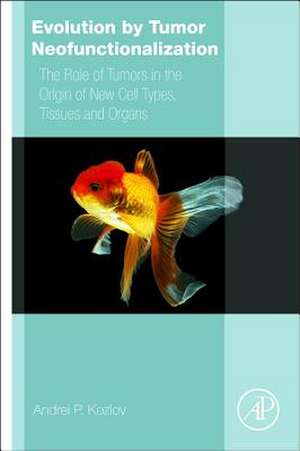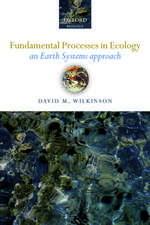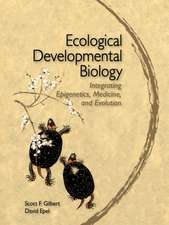Evolution by Tumor Neofunctionalization: The Role of Tumors in the Origin of New Cell Types, Tissues and Organs
Autor Andrei P. Kozloven Limba Engleză Paperback – 25 feb 2014
Widespread in nature tumors represent a much broader category than malignant tumors only. The majority of tumors in humans and other animals may never undergo malignant transformation. Tumors may differentiate with the loss of malignancy, and malignant tumors may spontaneously regress. Cellular oncogenes and tumor suppressor genes play roles in normal development. Many features of tumors could be used in evolution, and there are examples of tumors that have played a role in evolution.
This book will stimulate thinking on this topic by specialists in the fields of evolutionary biology, oncology, molecular biology, molecular evolution, embryology, evo-devo, tumor immunology, pathology and clinical oncology.
- Covers the role that tumors might play in evolution.
- Provides multidisciplinary approach that will appeal to a wide circle of professionals in the fields of evolutionary biology, oncology, molecular biology, and more
Preț: 226.74 lei
Preț vechi: 273.13 lei
-17% Nou
Puncte Express: 340
Preț estimativ în valută:
43.39€ • 46.40$ • 36.17£
43.39€ • 46.40$ • 36.17£
Carte tipărită la comandă
Livrare economică 10-24 aprilie
Preluare comenzi: 021 569.72.76
Specificații
ISBN-13: 9780128001653
ISBN-10: 0128001658
Pagini: 248
Ilustrații: illustrations
Dimensiuni: 152 x 229 x 14 mm
Greutate: 0.35 kg
Editura: ELSEVIER SCIENCE
ISBN-10: 0128001658
Pagini: 248
Ilustrații: illustrations
Dimensiuni: 152 x 229 x 14 mm
Greutate: 0.35 kg
Editura: ELSEVIER SCIENCE
Cuprins
1. The modern synthesis of evolutionary biology and the health sciences2. Evolution and pathology3. The widespread occurrence of tumors in multicellular organisms4. Features of tumors that could be used in evolution5. Tumors might participate in evolution of ontogenesis6. Tumors that might play the role in evolution7. Tumors that have played the role in evolution8. The general principles and molecular mechanisms of the origin of novel genes9. The origin of evolutionarily novel genes and evolution of new functions and structural complexity in multicellular organisms10. The origin of new cell types, tissues and organs by tumor neofunctionalization11. Experimental confirmation of nontrivial predictions of evolution by tumor neofunctionalization hypothesis12. Other evidence supporting the positive evolutionary role of tumors and hypothesis of evolution by tumor neofunctionalization13. Overview14. Conclusion
Recenzii
"...an excellent book that formulates the hypothesis of evolution by tumor neofunctionalization and presents interesting concepts related to the positive role of tumors in the evolution of multicellular organisms. It will be of immense interest to a diverse group of professionals...3 Stars - Score: 86" --Doody's.com, Nov 14, 2014














